Maschinenbaugipfel 2025 in Berlin – Between Crisis Mood and Signals of Renewal
On September 16 and 17, 2025, the Mechanical Engineering Summit took place in Berlin – the annual gathering of top representatives from politics, business, and academia. This year, the event was marked by an unusually tense atmosphere. The recession has visibly reached the mechanical engineering sector, orders are declining, and many companies are forced to cut jobs. Against this backdrop, expectations of the speakers were clear: they were to outline ways for the industry to navigate through this phase of uncertainty.
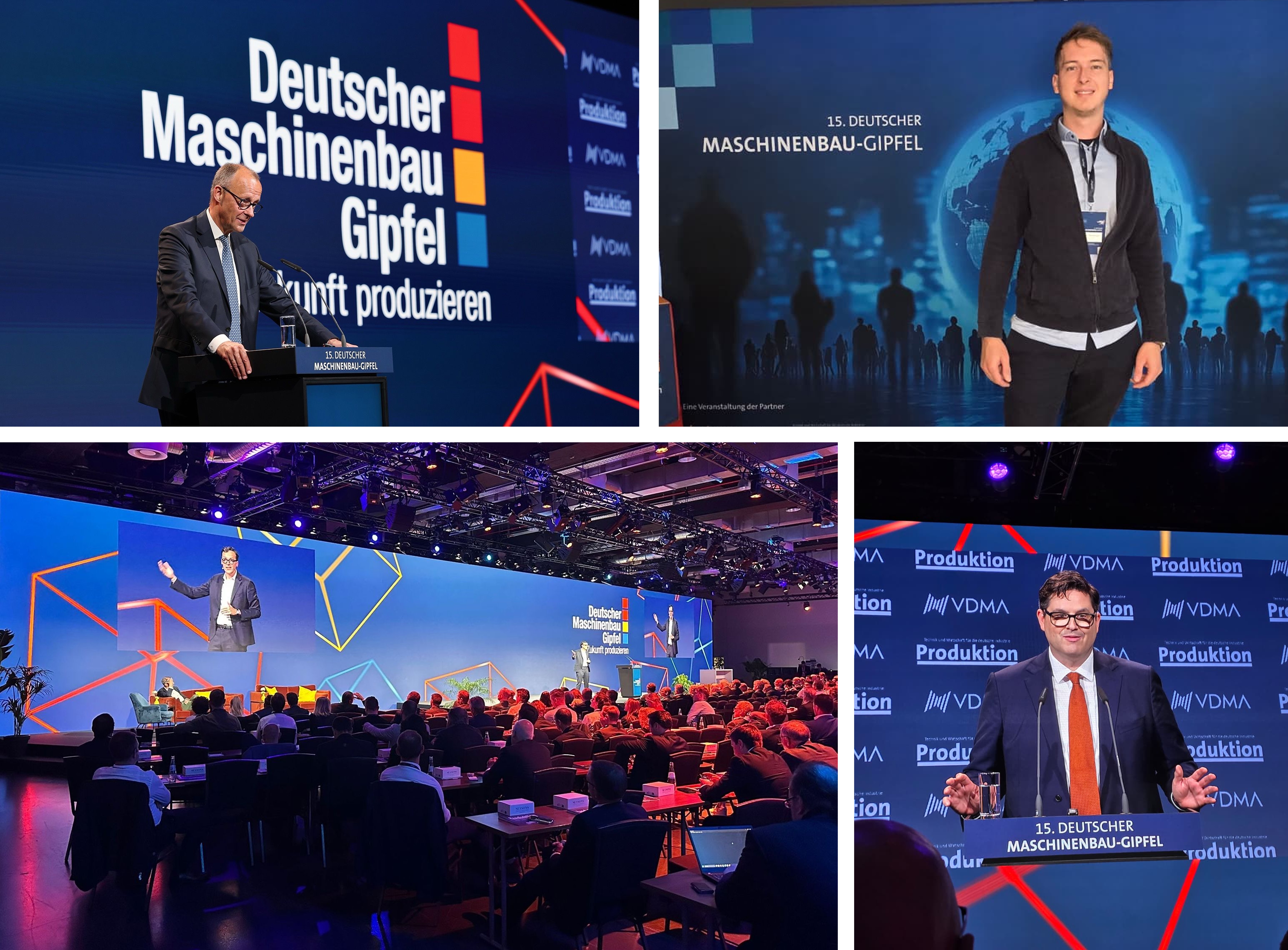
An Urgent Opening
The opening speech by VDMA President Bertram Kawlath set the tone right from the start. He described the current situation as threatening and said the industry was at a tipping point. The democratic center was in danger, and the mood among mechanical engineers was one of anger. This anger, however, was not directed at the future, but at the lack of urgently needed political reforms. Kawlath made it clear that the recession was not theoretical but tangible. Job cuts were already underway, and no improvement was in sight.
He called for an immediate relief agenda, highlighting three points in particular: lowering corporate tax rates, speeding up approval procedures for production sites, and more flexibility in the labor market. These measures, in his view, were not long-term visions but urgently needed steps to safeguard competitiveness.
Kawlath issued a particularly strong warning about the consequences of the current tariff dispute with the U.S. The steel tariff was much higher than originally announced, rendering many machines practically unsellable in the U.S. market. Instead of providing stability, the tariff deal brought new uncertainty. Germany, therefore, needed a new trade policy that consistently focused on opening new markets and negotiating free trade agreements at a faster pace. At the same time, he emphasized that the fight against climate change must not fall behind. It is the greatest challenge of our time, and industrial policy must combine ecological transformation with economic strength. As a positive example of bold reforms, he cited Denmark, which had taken difficult but necessary steps with retirement at 70.
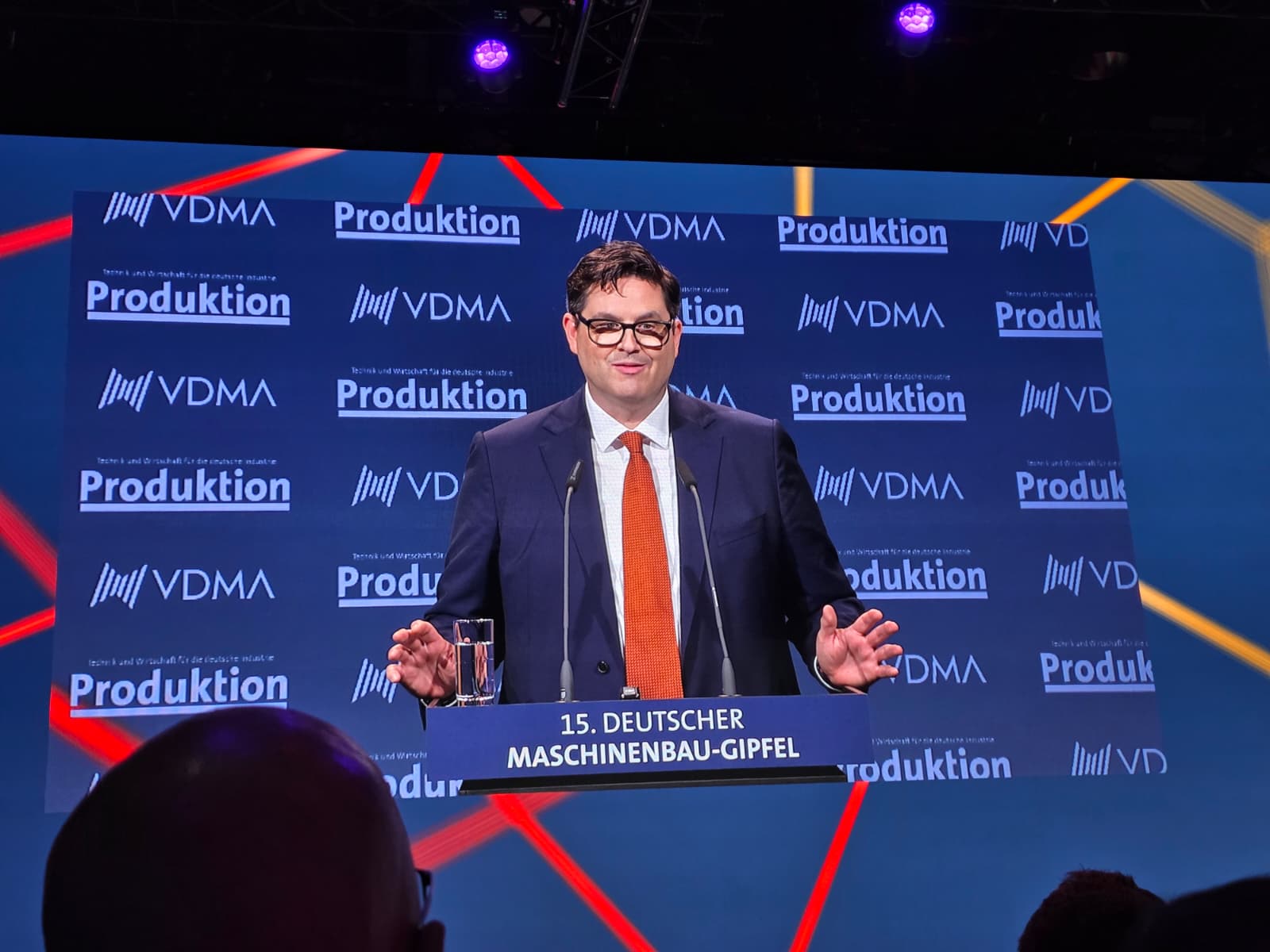
Politics Between Self-Praise and Reality
Chancellor Friedrich Merz, who took the stage on the first day, only partially picked up on the dramatic analysis of the VDMA President. Instead, he presented a list of already implemented measures: tax depreciation options, initial steps in reducing bureaucracy, and the modernization of the state now bundled in a central ministry. He promised to reduce compliance costs for companies by a quarter and warned against prescribing technologies. Instead, Germany must rely on openness to technology in order not to stifle innovation at birth.
His speech, however, extended far beyond mechanical engineering. Merz spoke about the need to secure peace and freedom in Europe, strengthen defense capabilities, and preserve a strong industrial base. He warned against expanding social policy at the pace of recent years. Citizen’s income needed reform to strengthen incentives for returning to the labor market.
He spoke particularly urgently about energy supply. Existing power plants should not be shut down before sufficient new capacity was created. New gas-fired power plants were therefore necessary. While targets for expanding renewables would need to be “slightly reduced,” the goal of providing environmentally friendly yet affordable energy remained.
At one point, the audience responded with brief laughter: when Merz described the current resolution of the U.S. tariff conflict as “the least bad” option, it became clear that no one expected genuine relief. He also stressed the urgent need for new trade partners, though exclusively via EU agreements.
Despite these serious points, the speech as a whole felt rather routine, almost like a standard party address. Many attendees missed a concrete engagement with the demands of the VDMA President.
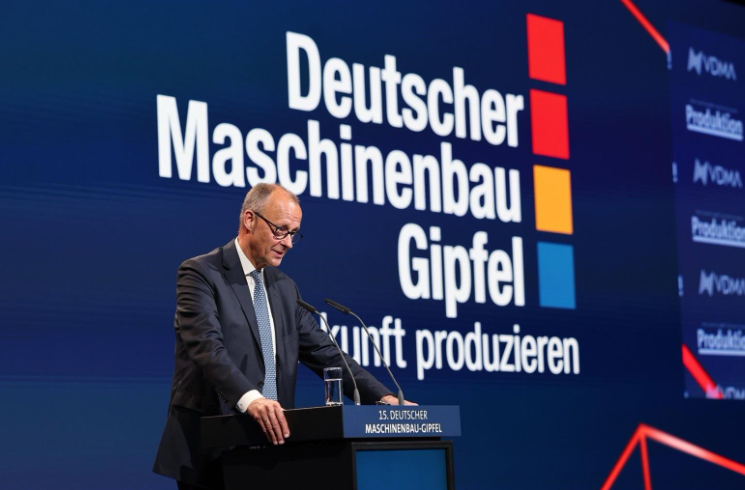
A European View from Copenhagen
Danish Minister of Industry Morten Bødskov brought a fresh impulse to the discussion. He placed the European dimension in focus and warned that the EU was no longer keeping pace in investments in future technologies. While the U.S. and China had massively invested in green tech, AI, and robotics in recent years, Europe had fallen behind.
Bødskov emphasized that strengthening the European internal market must be the top priority. Less talk, more concrete action – that was the approach he wished for during Denmark’s EU presidency. He identified three central barriers to be removed: too much bureaucracy, too little private investment, and too weak a commitment to future technologies. Robotics in particular held enormous potential to increase industrial productivity.
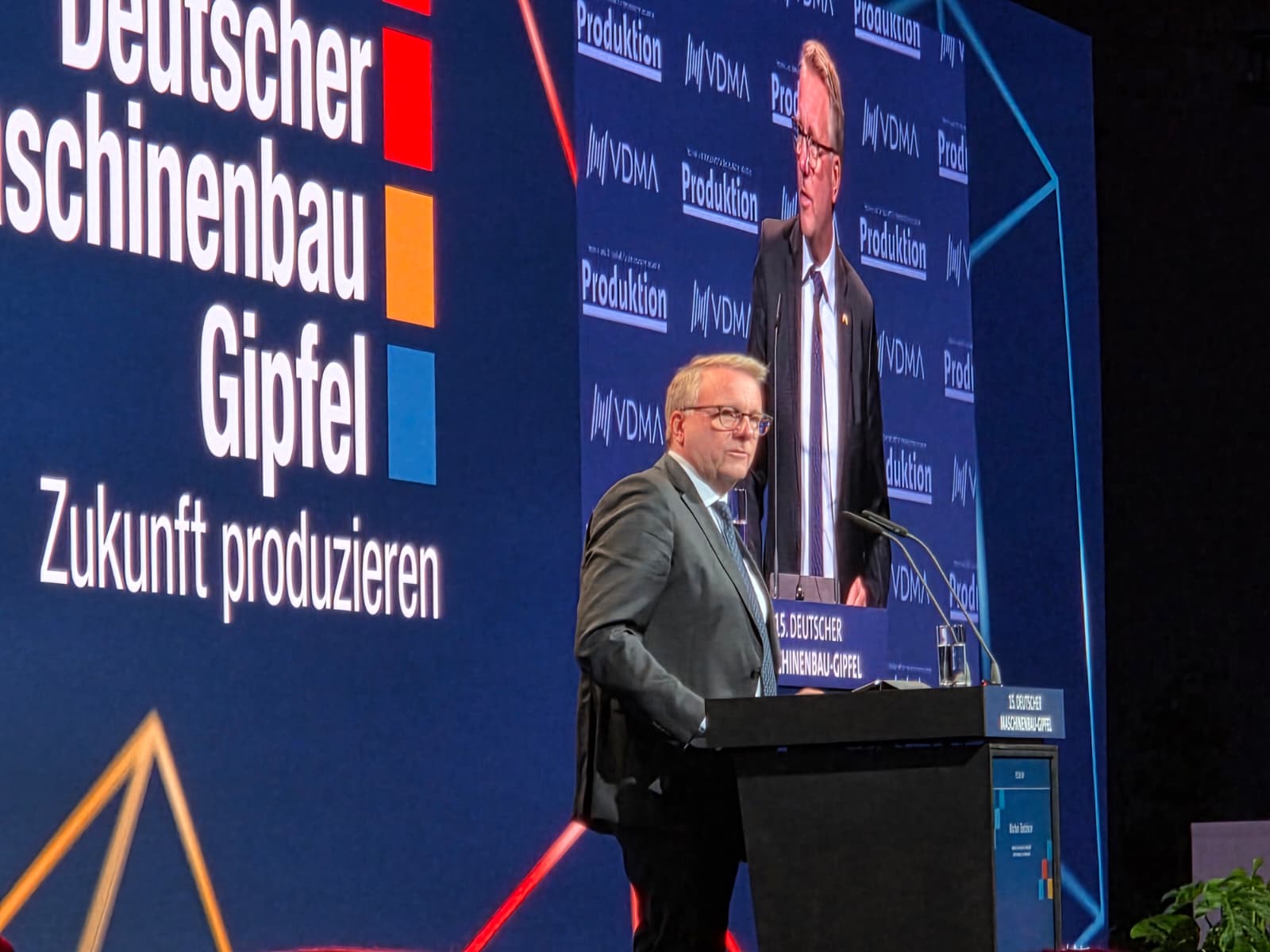
Mechanical Engineering in Global Competition
That the industry’s concerns are not just perceived but empirically verifiable was demonstrated by Professor Moritz Schularick. His study on the effects of geo-economic shocks showed clearly that tariffs massively burden German industrial exports. For mechanical engineering, there was a decline of nine percent, for the chemical industry even 23 percent.
Small companies, in particular, were vulnerable, as they relied more heavily on fewer export markets and faced higher adjustment costs. Many SMEs had focused on China and the U.S. – and were now under pressure. Schularick predicted that in the coming weeks, more and more companies would have to cease exports to the U.S. simply because costs were too high.
The conclusion of his analysis was clear: Germany and the EU must move more quickly to conclude new trade agreements while simultaneously pushing forward deregulation. Only in this way could market access be secured and competitiveness defended.
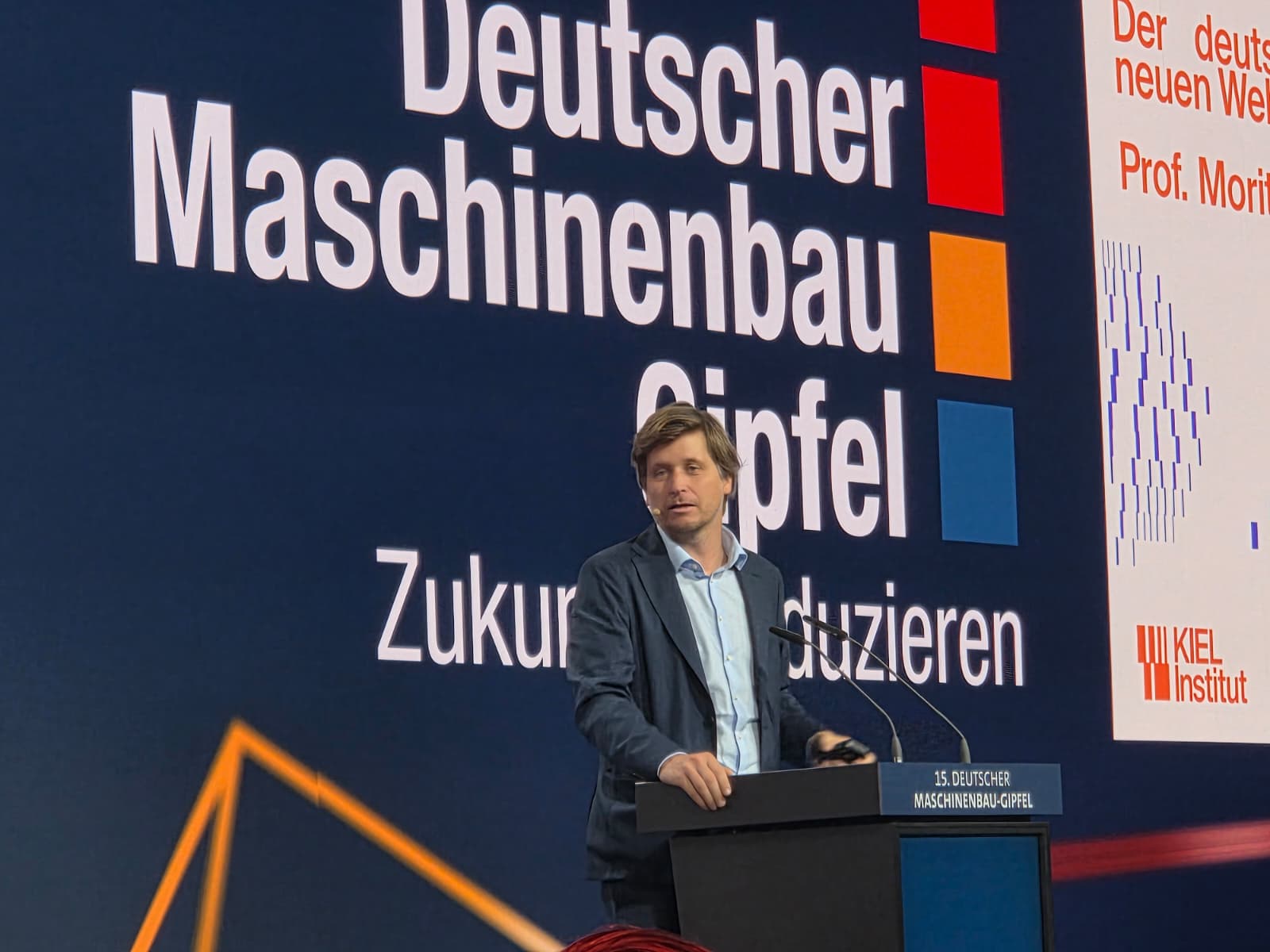
Artificial Intelligence as a Beacon of Hope
Amidst all the serious global economic issues, the summit also hosted a forward-looking debate. Under the title “AI – a Real Disruption?” representatives from Siemens, SAP, and the German government discussed the role of artificial intelligence in the industrial context.
Cedrik Neike of Siemens painted a picture that highlighted both opportunities and risks. More than 90 percent of companies wanted to adopt AI, but only seven percent had actively done so. While consumer AI, like ChatGPT, was already dominated by U.S. corporations, the race in industrial applications was still open. However, Europe lacked computing power, talent, and a clear data strategy. Yet mechanical engineering, in particular, held a treasure trove: bills of materials, CAD files, and time series data – information that, if used intelligently, could enable entirely new business models.
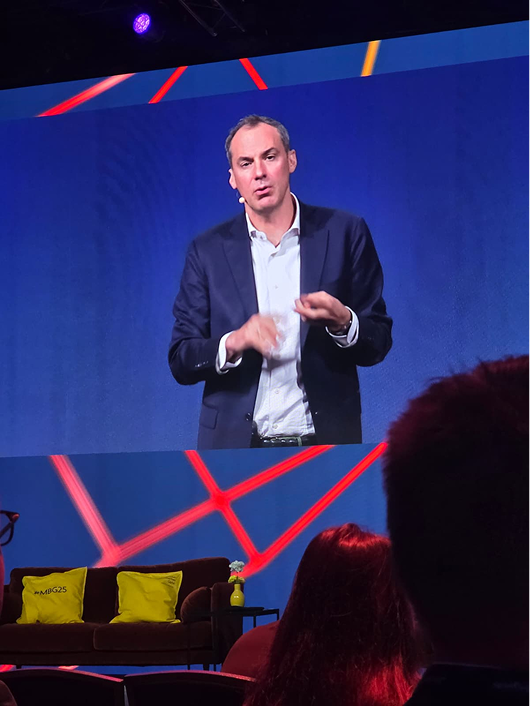
Sebastian Steinhäuser of SAP built on this by presenting a vision of Industry 2030, in which AI had become a constant co-pilot for companies. Processes could run ten times faster, and workers on the factory floor would no longer merely operate machines but orchestrate complex workflows. But for this to happen, companies needed more courage, clear data strategies, and shared data spaces. Projects like “Manufacturing X” could serve as blueprints.
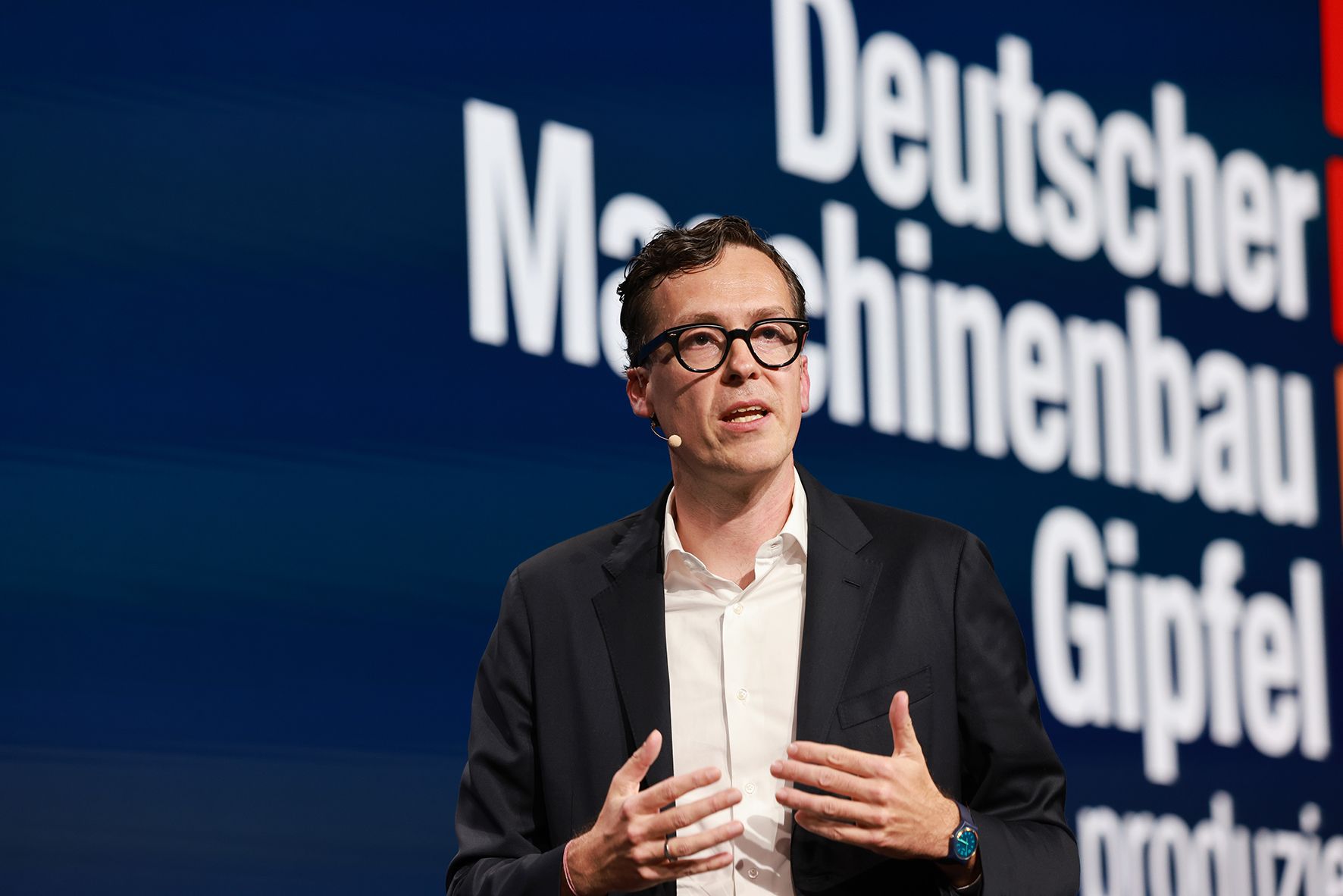
Thomas Jarzombek, Parliamentary State Secretary in the Ministry for Digitalization and State Modernization, emphasized that Germany was strong in basic research and had trained many AI talents domestically. But to compete globally, more international talent needed to be attracted, more data centers built in Europe, and greater risk appetite fostered in procurement. The old motto “Nobody has ever been fired for buying IBM” had to be replaced by more openness to new providers.
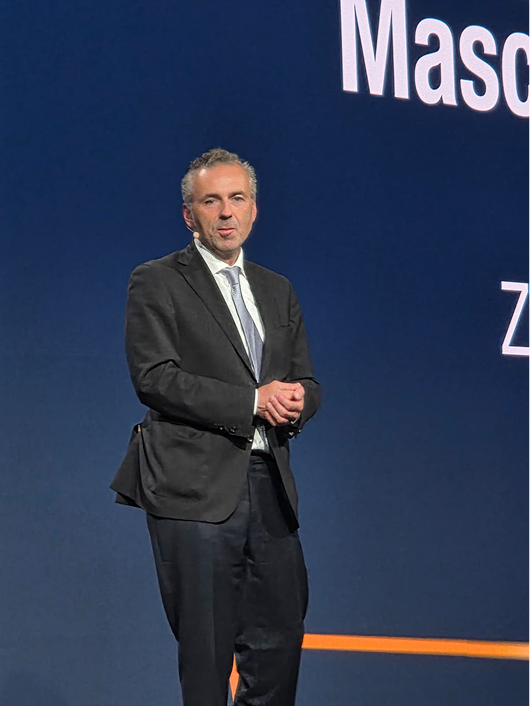
My Impression: Valuable Insights, but Many Lip Service Declarations
The Mechanical Engineering Summit 2025 in Berlin was a mirror of the industry’s current state. On the one hand, the crisis mood was unmistakable: exports are collapsing, the recession is a reality, and many companies are fighting for survival. On the other hand, there were also moments of optimism, especially where the focus was on the opportunities of digitalization and AI.
For me personally, the visit was worthwhile overall. It was fascinating to hear such a wide range of opinions from experts, managers, and politicians and to form my own picture of the situation. The summit provided a good overview of both the biggest challenges currently facing mechanical engineering and the technological developments that could open new perspectives. I also found it particularly positive that startups were given a platform, making it clear that innovation doesn’t come only from established corporations.
What I found disappointing, however, was that many of the political speeches sounded like lip service. Much of what was said had already been heard at similar events last year – without concrete solutions having been implemented in the meantime. A particularly stark negative example was Friedrich Merz’s speech. Instead of responding to the precise demands made by VDMA President Bertram Kawlath, he delivered a more classic party address in the tone of “we are already doing a lot, but our coalition partners are holding us back.” For me, the low point was when he presented renaming citizen’s income and cutting social spending as supposed solutions to the problems of mechanical and plant engineering. One can certainly debate the merits of such proposals, but on that day, they felt far removed from the urgently needed answers to the concrete problems Kawlath had clearly outlined.
Thus, my conclusion remains ambivalent: the summit offered many valuable insights and was enriching precisely because of the diversity of voices. At the same time, it became clear that the problem is not a lack of analysis but a lack of political determination to finally tackle the well-known issues with real resolve.
Benjamin Brockmann
Benjamin Brockmann (M. Sc., Management & Technology) founded Operations1 in 2017 together with Daniel Grobe (also M. Sc., Management & Technology). The founders developed the software solution based on various practical projects, including at the Fraunhofer Institute, and on their experience in industry, auditing and management consulting. Benjamin Brockmann has already worked for companies such as KPMG and Arthur D. Little.